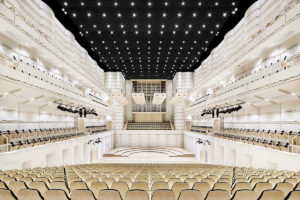
‘Concert Halls & Theatres Are Not Places of Infection,’ Suggests Study by Fraunhofer Heinrich Institute & Konzerthaus Dortmund
By Dejan Vukosavljevic(Credit: Konzerthaus Dortmund official website)
The Konzerthaus Dortmund has commissioned the Fraunhofer Heinrich Institute Goslar to investigate the spatial spread of aerosols and carbon dioxide in a concert hall. For the first time since the beginning of the COVID-19 pandemic, a study looked at the risk of infection for visitors to concert halls, theaters and opera houses.
The extensive tests in the auditorium and foyers of the Dortmund Konzerthaus took place on November 2, 3 & 20, 2020. The project has been conducted in collaboration with the German Environment Agency and hygiene experts. The study has demonstrated that the existing central ventilation system and wearing a face mask would greatly reduce aerosol and carbon dioxide pollution. Per findings, the risk of transmission of infectious agents by aerosol transmission can almost be excluded, especially in the auditorium.
Theoretically, even the full occupancy of the concert hall would be possible. However, after taking into account access routes and foyers, the overall recommendation was that only half of the auditorium capacity should be used. Per the findings, the seats should be distributed in a checkerboard pattern. The study finally concluded that the events in the concert halls, theaters, and opera houses cannot trigger a COVID-19 superspreader event if there is complete air exchange with outside air at least every 20 minutes. Wearing masks is always necessary in corridors, in break areas, and in the foyers.
“Concert halls and theatres are not places of infection,” said Dr. Raphael von Hoensbroech, Artistic Director of Konzerthaus Dortmund. “The past months have shown that politicians need a scientifically sound basis for decision making. With our study, we want to contribute, to help ensure that concert halls and theatres can again admit sufficient audiences when they reopen.”
North-Rhine Westphalia’s Minister of Culture and Science, Isabel Pfeiffer-Poensgen added, “The issue of ventilation is a decisive factor for the reopening of cultural institutions. The study of Konzerthaus Dortmund is therefore a valuable building block in the effort to enable performances to continue, even in times of pandemic. At the same time, it shows the great sense of responsibility that cultural institutions have towards their audiences.”
“In view of the great relevance of ventilation, the state government has set up a joint working group with cultural institution representatives who, among others, are currently developing a differentiated opening strategy based on scientific findings. Part of this is a broad-based analysis of the effectiveness of ventilation systems in North Rhine-Westphalian cultural institutions, the implementation of which began at the end of last year,” added Pfeiffer-Poensgen.
Categories
News


